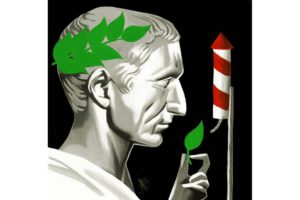The hour, date and kind of celebration have changed century to century
With its loud TV hosts, drunken parties and awful singing, New Year’s Eve might seem to have been around forever. Yet when it comes to the timing and treatment of the holiday, our version of New Year’s—the eve and day itself—is a relatively recent tradition.

ILLUSTRATION: THOMAS FUCHS
The Babylonians celebrated New Year’s in March, when the vernal equinox—a day of equal light and darkness—takes place. To them, New Year’s was a time of pious reckoning rather than raucous partying. The Egyptians got the big parties going: Their celebration fell in line with the annual flooding of the Nile River. It was a chance to get roaring drunk for a few weeks rather just for a few hours. The holiday’s timing, though, was the opposite of ours, in July.





